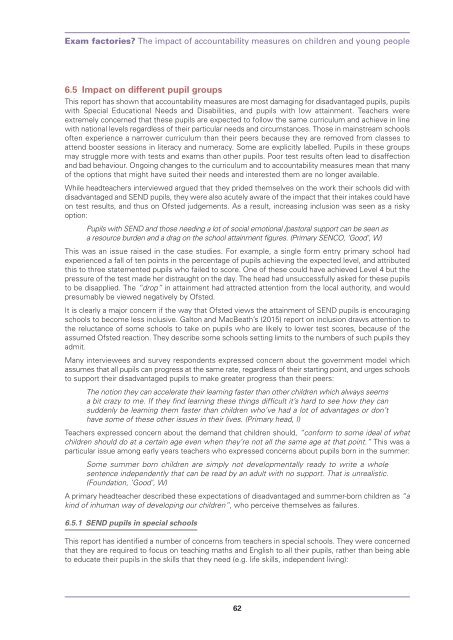exam-factories
exam-factories
exam-factories
You also want an ePaper? Increase the reach of your titles
YUMPU automatically turns print PDFs into web optimized ePapers that Google loves.
Exam <strong>factories</strong>? The impact of accountability measures on children and young people6.5 Impact on different pupil groupsThis report has shown that accountability measures are most damaging for disadvantaged pupils, pupilswith Special Educational Needs and Disabilities, and pupils with low attainment. Teachers wereextremely concerned that these pupils are expected to follow the same curriculum and achieve in linewith national levels regardless of their particular needs and circumstances. Those in mainstream schoolsoften experience a narrower curriculum than their peers because they are removed from classes toattend booster sessions in literacy and numeracy. Some are explicitly labelled. Pupils in these groupsmay struggle more with tests and <strong>exam</strong>s than other pupils. Poor test results often lead to disaffectionand bad behaviour. Ongoing changes to the curriculum and to accountability measures mean that manyof the options that might have suited their needs and interested them are no longer available.While headteachers interviewed argued that they prided themselves on the work their schools did withdisadvantaged and SEND pupils, they were also acutely aware of the impact that their intakes could haveon test results, and thus on Ofsted judgements. As a result, increasing inclusion was seen as a riskyoption:Pupils with SEND and those needing a lot of social emotional /pastoral support can be seen asa resource burden and a drag on the school attainment figures. (Primary SENCO, ‘Good’, W)This was an issue raised in the case studies. For <strong>exam</strong>ple, a single form entry primary school hadexperienced a fall of ten points in the percentage of pupils achieving the expected level, and attributedthis to three statemented pupils who failed to score. One of these could have achieved Level 4 but thepressure of the test made her distraught on the day. The head had unsuccessfully asked for these pupilsto be disapplied. The “drop” in attainment had attracted attention from the local authority, and wouldpresumably be viewed negatively by Ofsted.It is clearly a major concern if the way that Ofsted views the attainment of SEND pupils is encouragingschools to become less inclusive. Galton and MacBeath’s (2015) report on inclusion draws attention tothe reluctance of some schools to take on pupils who are likely to lower test scores, because of theassumed Ofsted reaction. They describe some schools setting limits to the numbers of such pupils theyadmit.Many interviewees and survey respondents expressed concern about the government model whichassumes that all pupils can progress at the same rate, regardless of their starting point, and urges schoolsto support their disadvantaged pupils to make greater progress than their peers:The notion they can accelerate their learning faster than other children which always seemsa bit crazy to me. If they find learning these things difficult it’s hard to see how they cansuddenly be learning them faster than children who’ve had a lot of advantages or don’thave some of these other issues in their lives. (Primary head, I)Teachers expressed concern about the demand that children should, “conform to some ideal of whatchildren should do at a certain age even when they’re not all the same age at that point.” This was aparticular issue among early years teachers who expressed concerns about pupils born in the summer:Some summer born children are simply not developmentally ready to write a wholesentence independently that can be read by an adult with no support. That is unrealistic.(Foundation, ‘Good’, W)A primary headteacher described these expectations of disadvantaged and summer-born children as “akind of inhuman way of developing our children”, who perceive themselves as failures.6.5.1 SEND pupils in special schoolsThis report has identified a number of concerns from teachers in special schools. They were concernedthat they are required to focus on teaching maths and English to all their pupils, rather than being ableto educate their pupils in the skills that they need (e.g. life skills, independent living):62


